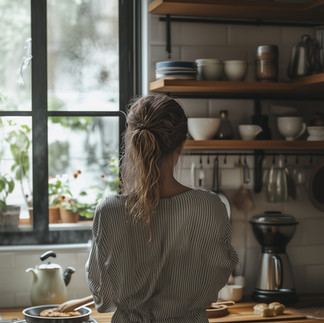Teaching justice through home care
- Inbar Lee Hyams

- Aug 24
- 7 min read
Updated: Sep 2

This week's Torah portion, Shoftim (Deuteronomy 16:18-21:9), gives us the famous command "Tzedek tzedek tirdof" - Justice, justice you shall pursue.
Yesterday, I watched my daughter dramatically collapse onto the kitchen floor after being asked to unload the dishwasher. "But it's not FAIR" she whined, "I didn't even use any of these dishes". And there I stood, holding a dish towel, thinking about how many times I've had that exact same internal tantrum about household maintenance. Who among us hasn't felt the righteous indignation of being the only one who seems to notice the overflowing garbage or the mysterious pile of shoes by the front door?
Rabbi Elya Meir Bloch teaches that the double use of "justice" in our Torah portion means something profound: "the pursuit OF righteousness must also be pursued WITH righteousness." We can't run after justice using unjust methods. The ends cannot justify the means.
In our old home, I often tried to create fairness through guilt, manipulation, and martyrdom - none of which were particularly just methods. They also didn't work.
Whether that sounds like you or not, back-to-school season brings renewed hope for household systems and routines. It's the perfect time to ask: What if our homes could teach the same principles of justice that Moses outlined for an entire nation? What if every corner of our living space could model the truth that we are all responsible for each other?
ROOM OF THE WEEK: THE KITCHEN
The kitchen serves as the heart of family operations and, let's be honest, the epicenter of most "but it's not fair" battles. Like the courts Moses envisioned in every city, our kitchens need clear systems that everyone can understand and trust. When chi flows well through this space, family cooperation tends to flow more smoothly too.
The kitchen sits in different bagua areas depending on your home's layout, but its function remains consistent: it's where we nourish our bodies and, ideally, nurture our relationships through shared responsibility.
DAILY ENERGY FOCUS
This week we're focusing again on Family Harmony alongside stagnant chi and rushing chi patterns, as they represent the specific tension between fairness and flow that this week's post illuminates.
Sunday (Yang/Sun)
OBSERVE stagnant chi indicators in your kitchen. Notice: where tasks pile up untouched for days, creating energetic "dead zones." Yang energy reveals: how avoidance creates more work for everyone. Those with 3, 4, or 9 numbers may find this especially enlightening for understanding family growth dynamics.
Monday (Yin/Moon)
SENSE rushing chi indicators in your kitchen. Check if: family members dash through without participating in maintenance, creating a "hit and run" energy. Yin energy asks: What would it feel like to slow down and tend to this shared space together?
Tuesday (Fire/Joy)
NOTICE the fire qualities in your kitchen - bright task lighting, how voices carry during meal prep, the energy around your stove and cooking areas. DETECT signs of stagnant chi by observing: dishes that sit unwashed while new meals are prepared on top of the mess. Fire's transformative energy asks: How can we turn the drudgery of kitchen maintenance into something that brings the family together?
Wednesday (Water/Flow)
OBSERVE water elements in your kitchen - your sink area, how family members naturally move through the space, the smooth vs. interrupted flow around your island or peninsula. SENSE stagnant chi through: the way clean dishes sit in the drying rack for days because no one "owns" the task of putting them away. The flowing energy of water asks: What's blocking the natural rhythm of kitchen work from flowing between family members?
Thursday (Wood/Growth)
FEEL the wood energy in your kitchen - any plants on windowsills, wooden cutting boards, vertical storage, where family members pause vs. where they rush through. CHECK IF rushing chi is present by noticing: family members who grab what they need and disappear, leaving the prep work and cleanup for others. The growing energy of wood asks: How can kitchen responsibilities help each family member grow in care for our shared home?
Friday (Metal/Structure)
SENSE metal qualities in your kitchen - appliances, organized vs. scattered utensils, the precision of your systems, how clear your family's expectations are about kitchen maintenance. DETECT rushing chi by observing: the way family members expect kitchen magic to happen without participating in the process. The structured energy of metal asks: What systems would make kitchen fairness feel automatic rather than negotiated every time?
Saturday (Earth/Grounding)
REST and INTEGRATE this week's chi observations. Simply NOTICE: how your kitchen's energy affects family harmony while considering both stagnant chi (tasks that don't get done) and rushing chi (people who don't slow down to help) patterns discovered this week. Earth's grounding energy asks: How can our kitchen become a place where responsibility feels like care rather than burden?
BAGUA MAP BY ROOM
Before we look at where your kitchen falls, consider this: Structure vs. Flow - Where would more systems and organization serve your family? Your daily routines or household maintenance processes? And where do you need to loosen up and go with the current - your expectations of perfection or how you handle unexpected messes?
Once you identify these areas, you can use your kitchen (and the corresponding bagua areas) to support both needs - either maintaining/deepening helpful structures or creating opportunities for more flexible flow where needed.
If your kitchen falls in one of these areas of the bagua map, here's how to work with fair divisions of responsibility:
*In BTB feng shui, we align your front door with the bottom of the tic tac toe board below to determine the location of each gua. This is different from the Compass approach to feng shui which uses directions for alignment. Also note that the rooms and walls of your home won't perfectly align with the bagua map, and some rooms may fall in more than one gua area.
┌─────────────────┬─────────────────┬─────────────────┐
│ Wealth │ Fame │ Relationships │
│ Corner │ Corner │ Corner │
├─────────────────┼─────────────────┼─────────────────┤
│ Family │ Center │ Children │
│ Corner │ │ Corner │
├─────────────────┼─────────────────┼─────────────────┤
│ Knowledge │ Career │ Helpful People │
│ Corner │ Corner │ Corner │
└─────────────────┴─────────────────┴─────────────────┘
↑ ↑ ↑
Front door typically aligns somewhere along this edgeWealth & Prosperity Area (Gua 4):
How does your kitchen here support or challenge your family's understanding that shared responsibility creates abundance for everyone? A kitchen in the wealth area asks us to consider: does everyone contribute to the "wealth" of a well-functioning home, or do some family members take without giving back? The growth energy of wood responds to green colors and tall, rectangular shapes. Consider: ORGANIZE a family meeting to CREATE a fair division system, CLEAR the expectation that one person does all the giving, TEND to systems that make everyone's contribution visible.
Fame & Reputation Area (Gua 9):
How does your kitchen in the fame area support or challenge your family's reputation for fairness and cooperation? When friends visit, does your kitchen reflect a family where everyone participates, or does it reveal the invisible labor of one person? Fire's transformative energy thrives with red accents and triangular shapes. Consider: ADD a family job chart in bright colors, CLEAR the shame around asking for help, AMPLIFY recognition when everyone contributes to kitchen maintenance.
Love & Relationships Area (Gua 2):
How does your kitchen here support or challenge loving relationships through fair distribution of care work? Kitchen tasks can either build resentment or strengthen bonds, depending on how justly they're shared. The nurturing earth energy responds to yellow tones and ceramic pottery or clay items. Consider: TEND to conversations about fairness with patience, ORGANIZE kitchen tasks by family members' natural rhythms, ADD elements that make working together feel nurturing rather than burdensome.
Family & New Beginnings Area (Gua 3):
How does your kitchen in the family area support or challenge healthy patterns of mutual care and new ways of sharing responsibility? This placement particularly calls for breaking old patterns where one person carries the invisible load. The expansive wood energy benefits from green colors and vertical elements. Consider: CLEAR outdated expectations about who "should" handle what, ADD new family traditions around kitchen teamwork, TEND to each person's growing capacity for household contribution.
Health, Gratitude & Unity Center (Gua 5):
How does your kitchen as the center affect your family's overall balance between individual needs and collective responsibility? The kitchen at the center reminds us that fair divisions of labor support everyone's wellbeing, not just the person who previously did everything. The grounding center energy works with ceramic pottery and clay items in earth tones. Consider: ORGANIZE a system for rotating responsibilities fairly, ADD pottery containers to organize kitchen utensils by task (baking tools, cooking utensils, etc.) so everyone knows where things belong, REST in the knowledge that teaching fairness is a form of love.
Children & Creativity Area (Gua 7):
How does your kitchen here support or challenge your children's creative participation in household maintenance and their understanding that fairness includes their contribution? This placement asks: are we raising kids who expect to be served, or kids who know how to serve others? Metal's precision energy responds to white colors and round shapes. Consider: CLEAR age-inappropriate expectations while maintaining appropriate ones, ADD systems that make participation easier for smaller hands, ORGANIZE tasks that match each child's developing capabilities.
Wisdom, Knowledge & Spirituality Area (Gua 8):
How does your kitchen here support or challenge the deep learning that comes from shared responsibility and the spiritual practice of caring for our shared spaces? The kitchen in the wisdom area teaches that maintenance is a form of meditation and justice-making. The stable mountain energy of earth responds to brown jasper or smoky quartz gemstones and terra cotta tones. Consider: CLEAR the distinction between 'kid work' and 'grown-up work' by teaching that all work maintains our shared home, ORGANIZE age-appropriate tasks that build competence and connection, ADD regular acknowledgment of how shared responsibility strengthens family bonds.
Career & Life Journey Area (Gua 1):
How does your kitchen in the career area support or challenge your family members' understanding that life skills include caring for shared spaces and that fairness is a crucial life competency? Water's flowing energy benefits from dark colors and curved shapes. Consider: CLEAR the message that housework isn't "real work," ADD recognition that kitchen skills are life skills, AMPLIFY conversations about how fairness at home prepares us for fairness in the world.
Helpful People & Travel Area (Gua 6): How does your kitchen here support or challenge your family's ability to be helpful to each other and your understanding that we all need help with maintaining our shared space? This area reminds us that asking for help isn't weakness - it's wisdom. Metal's clarity energy works with white and metallic colors. Consider: ORGANIZE a system where family members help each other rather than leaving everything to one person, ADD appreciation for when family members notice what needs doing, CLEAR the belief that we should handle everything ourselves.
CLOSING INSIGHT
Ibn Ezra taught that 'tzedek tzedek tirdof' means we must pursue justice 'whether we win or lose' - meaning even when it would be easier to just do it ourselves. Teaching our children to share responsibility isn't about our convenience; it's about their character. Sometimes the most spiritual acts are the most practical ones.











